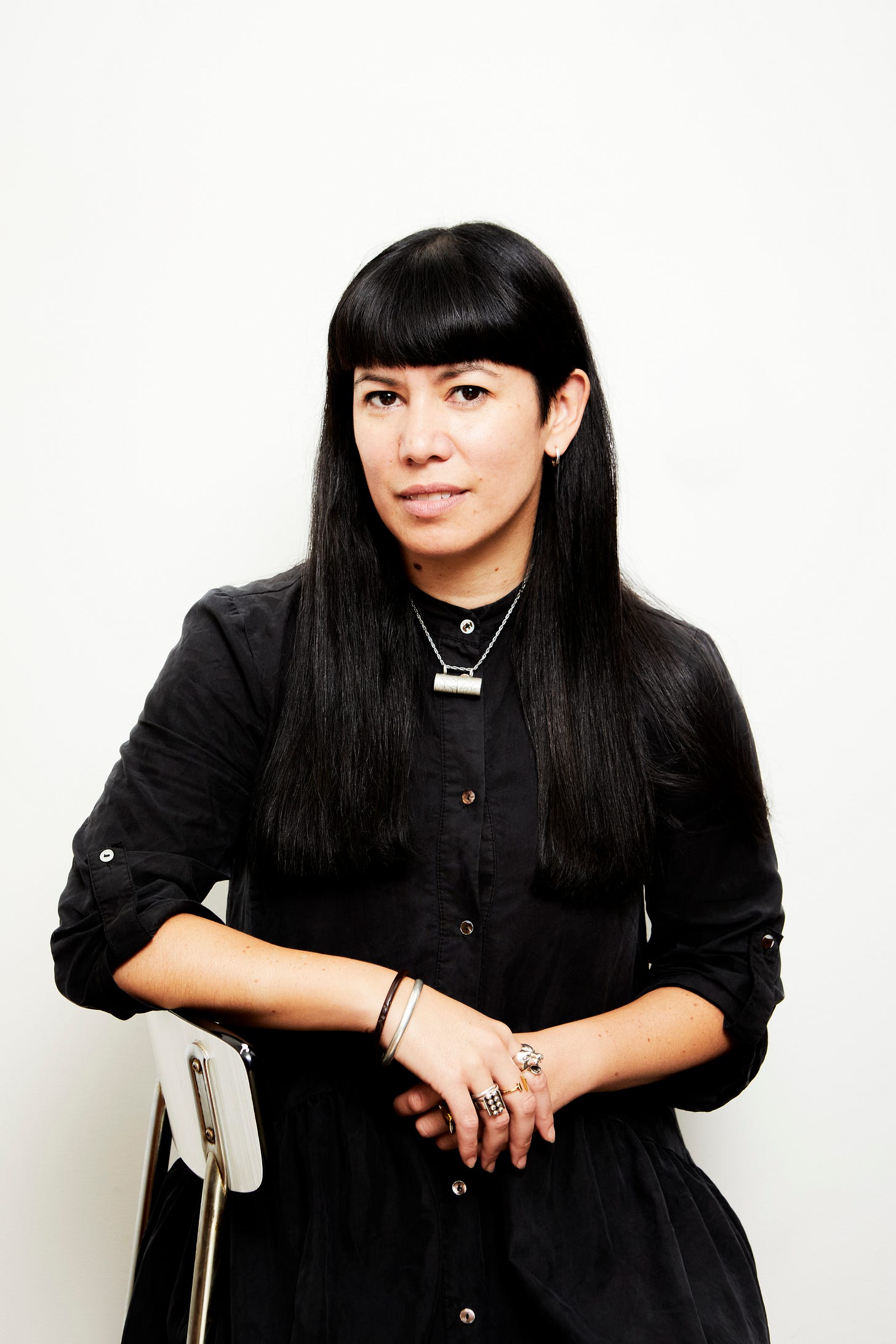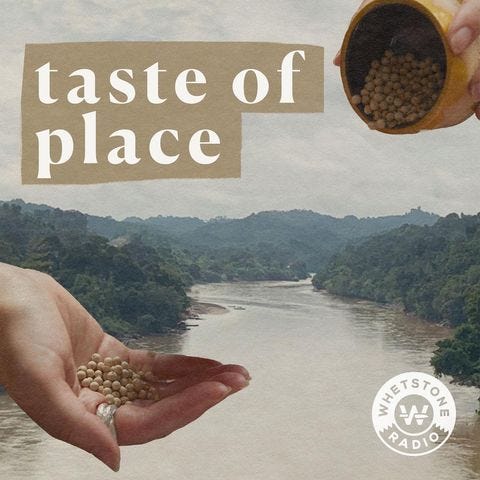Anna Sulan Masing: “We’re agents on the move as opposed to caught in-between”
The writer on her non-binary outlook, expanding the definition of mixedness and moving beyond tick boxes
Image: Patricia Niven
Hi, welcome back to Mixed Messages! This week I’m speaking to writer, academic and podcaster, Anna Sulan Masing, who is of mixed Iban and white New Zealand heritage (with Scottish roots.) Anna is in the throes of editing her book Chinese and Other Asian, out in 2024, which explored East and Southeast Asian identity in the UK. The book is sure to be a powerful read, diving into community, heritage and, of course, food – a topic Anna is known for. Read her story below.
How do you describe your background?
My father is Iban, which is an indigenous group – a tribe is how it loosely gets described in Sarawak, which is in Borneo. Indigeneity isn’t just people from that place, it’s about a connection with nature, understanding a non-binary communication with the world around you. So in some ways I feel that indigenous culture is a lot stronger than this idea of Asianness that I have.
My mother is a white New Zealander, both of her parents have Scottish roots. Her family came across after being granted accessibility or funds or whatever it was in the late 1800s that allowed white British people to go to these colonies and establish white colonies.
My mum met my dad when she was 17 – he came to New Zealand on a scholarship for university. They got married, but later split up and I ended up growing up most of my time in New Zealand and then back and forth to Malaysia. I left home on my 20th birthday and I’ve been in the UK for 21 years.
What terminology do you use to describe your racial identity?
I use ‘mixed-race.’ I think there’s complications with every framing, and everyone needs to work out what’s best for themselves. If you refer to someone as being ‘mixed’ and they correct you, that’s ok. Everyone has their own relationship with it.
I think ‘mixed’ is the best term for me because I like that it’s not binary. It’s mixing things up or ‘a mix of,’ because mixed isn’t just a racial identity, it’s cultural reference points. My cultural reference point is Malaysia, or a West Malaysia version because that’s what’s understood in the UK. For me to talk about an East Malaysian or Sarawak identity, there isn’t a relationship with that in the UK. People don’t know that story.
I also feel like my cultural reference points are of Malaysian Chinese or East Asian heritage because in Malaysia we would eat out at a lot of Chinese restaurants, so I know a lot about Chinese Malaysian food and food culture. Those are easy in points for people.
When you’re a migrant, you’re constantly going into spaces and reintroducing yourself. You have to tap into those points of commonality or references and that is difficult and complicated. There can be agency and creativity as well. Sometimes it's kind of fun, sometimes it's just exhausting. You adapt to what works in those spaces and what people reference.
You’ve lived in different places around the world – has that affected your sense of self?
Growing up, I was constantly racialised and I didn’t really understand it. I thought, ‘if you’re going to racialise me, I better know who I am,’ so my PhD was about navigating that. It was also about understanding that there are all these stories, like the ones I’d heard as a kid from my grandmother, that sit within you and you don’t know what to do with – you don’t know what the knowledge is until you work out why it got there in the first place. A lot of these stories didn’t sit within the framework of Western education, so trying to reconnect with those ideas and experiences.
When you start thinking about who you are, you realise you are a product of colonialism. So what are those colonial systems that have set you up to be in this position now and how do you navigate them on a daily basis and within a lifetime? There’s a sense of responsibility about what your place in the world is, what you should or shouldn’t be doing.
How have you felt connected to your cultural heritage throughout your life?
I’m very grateful that my mother instilled this idea of being Malaysian and Iban in us. I was surrounded by Ibanness in the formative years of my life. I felt that very strongly. But when I first started my PhD talking about in betweenness, I felt that. My approach to life has always felt non-binary, that we don’t have to fit into boxes, so doing research and finding the academic theory around being able to hold multiple identities was a real breakthrough for me.
Annoyingly my mum was fluent in Iban, but she stopped speaking it when we moved to New Zealand which is understandable. My mum was a single mum working night shifts in a retirement home, it’s not like she had like all this time to think about speaking to her kids in Iban. It was more like ‘get up, get dressed, go to school!’
Something that interests me about mixedness is that there are a lot of people who might not be mixed-race but have grown up in multiple cultures. That has a lot of similarities, so being inclusive in these conversations is important.
Did you have any conversations with your family about being mixed when you were growing up?
Not really. My mum tells me that in Malaysia I came home one day and said to her ‘I hate being half-white, I just want to be Iban.’ That’s obviously about wanting to be part of the norm.
How has your mixedness impacted your career and the work you produce?
Writing is a really good way to navigate where you fit into the world, so that’s what I’ve done. I started out in theatre and trying to tell stories that way, then poetry, which I find a much easier way of expressing complicated things.
Journalism has been a good format to investigate food. Like language, food is something that constantly evolves. It’s quite fast. We can look at how multiple influences and heritages can work together to create change, understanding these histories and being respectful of them. We can also give honour and agency to the idea of how authenticity and tradition changes, and therefore identities change. I think being mixed allows me a lens to investigate a bunch of stuff.
You have a book, Chinese and Other Asian, coming out in 2024. Can you tell me what it’s about?
It’s based on tick boxes, that they just don’t exist for East and Southeast Asian people. You’re either Chinese or ‘other Asian.’ If you’re mixed, it’s mixed Chinese or ‘mixed other Asian,’ there’s no box if you’re half-Chinese and half-Black, for example. We can’t have these tick boxes, no one fits them. How are we supposed to develop policy around equality and equity if we don't have the ability to find diversity within our identities? My book is about how we got to the tick boxes, why they exist and how we can move beyond them.
White gets seen as a neutral, that to be mixed you have to be mixed with white. We see that repeated within cultural spaces, like rom-coms. Why is a legitimate romance for someone who isn’t white with a white person, and that’s the only way we can legitimately understand them being in love, to touch them with a white hand? It's the same with food, food isn't legitimate until a white hand touches it and elevates it. It's super gross and upsetting.
I touch on that in my book, but it’s really about investigating the experience and identity of East and Southeast Asian people in the UK. I’m really interested in how we understand and move through space, looking at migration policy and empire, how the empire told us ‘we say that you’re a part of us because we have to prove that we owned you, but we don’t want you here.’
How do you think the conversation around mixedness needs to develop?
We need to hear more stories so that we understand the breadth of the meaning of mixedness. I’ve always said ‘mixed’ because it makes sense to me, but I’m specific about the Asianness that I fit into. It’s really important to understand that the Black community in this country has had a very specific, oppressive and complex history, so it’s trying to make sure that there’s space for that identity to be specific and negotiated in a different way to mine.
It would be good to be able to get to a point where mixedness is opened up to not just mean ‘and white,’ and to talk about more cultural experiences and nuances and not just skin. That only happens with more conversation. It’s happening more and more, but there’s a worry about people co-opting the conversation in mainstream spaces without understanding the historical consciousness particularly related to Black and mixed-Black communities in the UK. It’s about being generous to people in terms of understanding things in different ways.
What’s the best thing about being mixed for you?
I think it’s important to find the creativity and understanding that we have agency. We’re agents on the move as opposed to being caught in-between. We can hold multiple identities and I think that's super important, and difficult.
One of the best things is being able to have multiple points of reference. When you’re reading, talking, cooking, eating, sharing, you have these multiplicities that you can draw on. I think that's really exciting and it's definitely informed the way I look at the world. It’s such a privilege to be able to cross spaces, which as mixed people you often can. As opposed to being left out of spaces I think we’re actually let into spaces.
Can you sum up your mixed experience in one word?
Multiplicity.
Anna’s podcast, Taste of Place, is available wherever you get your podcasts. Follow Anna on Instagram and Twitter. Next week, I’ll be speaking to artist Sarah Maple. Subscribe to get Mixed Messages in your inbox on Monday.
Enjoy Mixed Messages? Support me on Ko-Fi! Your donations, which can start from £3, help me pay for the transcription software needed to keep this newsletter weekly, as well as special treats for subscribers. I also earn a small amount of commission (at no extra cost to you) on any purchases made through my Bookshop.org affiliate links.
Mixed Messages is a weekly exploration of the mixed-race experience, from me, Isabella Silvers. My mom is Punjabi (by way of East Africa) and my dad is white British, but finding my place between these two cultures hasn’t always been easy. That’s why I started Mixed Messages, where each week I’ll speak to a prominent mixed voice to delve into what it really feels like to be mixed.








